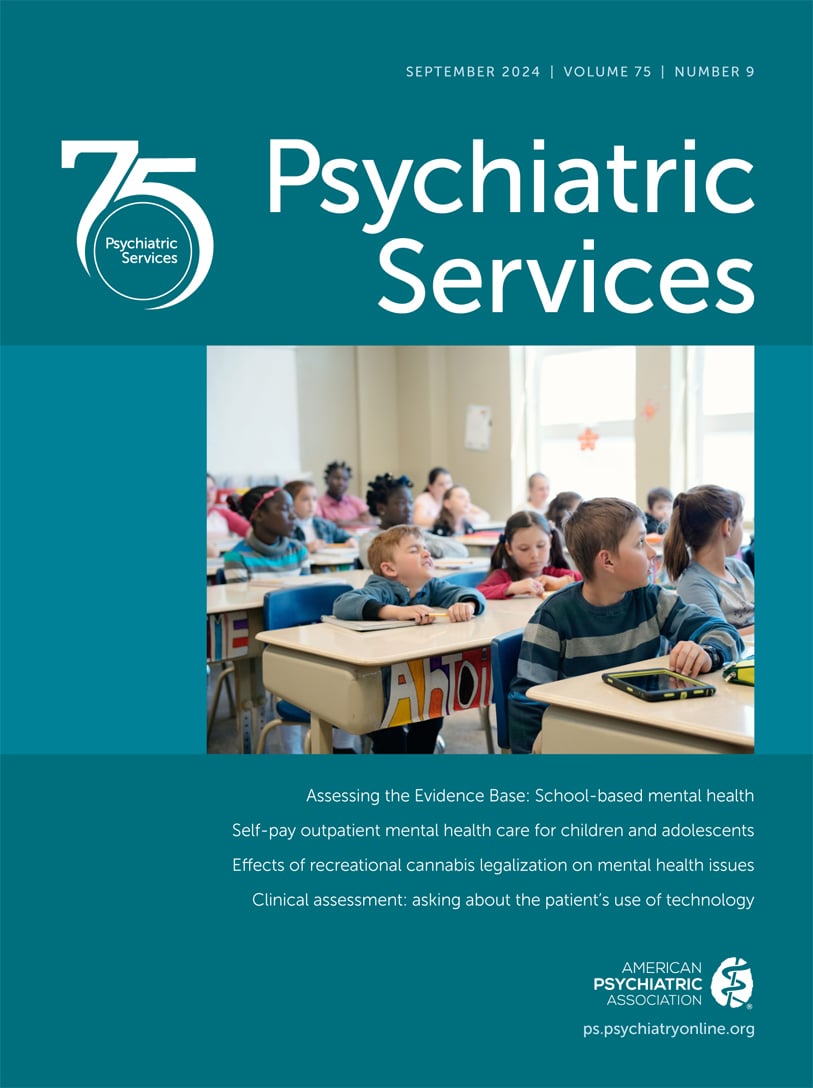Psychiatric Services
- Volume 65
- Number 9
- September 2014
Taking Issue
This Month's Highlights
Columns
Publication date: 01 September 2014
Pages1081–1083Transitioning from jail or prison to community living frequently results in homelessness and recidivism. Access to benefits such as Supplemental Security Income (SSI) and Medicaid can increase access to housing and treatment and reduce recidivism. The ...
https://doi.org/10.1176/appi.ps.201400120Publication date: 01 September 2014
Pages1084–1087This column describes the current state of resources and practice in mental health care in the Anglophone countries of West Africa: the Gambia, Sierra Leone, Ghana, Nigeria, and Liberia. Information was systematically gathered from the five countries by ...
https://doi.org/10.1176/appi.ps.201300300Articles
Publication date: 01 September 2014
Pages1088–1099In recent years, the mental health field has made learning collaboratives the centerpiece of efforts to implement training in evidence-based practices. Lasting an average of 14 months, these interventions typically begin with in-person training for two ...
https://doi.org/10.1176/appi.ps.201300229Publication date: 01 September 2014
Pages1100–1104Advocates of mental health courts (MHCs) contend that the courts offer a more humane and cost-effective way to meet the treatment needs of persons with mental illness in the criminal justice system. The authors report on a multisite, case-control ...
https://doi.org/10.1176/appi.ps.201300375Publication date: 01 September 2014
Pages1105–1112Evidence has accumulated that mental health courts (MHCs) reduce rearrests and extend the time to rearrest among persons with mental illness. So far, however, many of these studies have lacked a rigorous experimental design. In this article, the authors ...
https://doi.org/10.1176/appi.ps.201300305Publication date: 01 September 2014
Pages1113–1119One of only two states with statewide jail diversion programs, Connecticut identifies persons with mental illness at arraignment and diverts them straight to the community. However, judges may order a brief incarceration to stabilize individuals or ...
https://doi.org/10.1176/appi.ps.201300286Publication date: 01 September 2014
Pages1120–1125Objective California’s full-service partnerships (FSPs) provide a combination of subsidized permanent housing and multidisciplinary team–based services with a focus on rehabilitation and recovery. The goal of the study was to examine whether participation ...
https://doi.org/10.1176/appi.ps.201300380Publication date: 01 September 2014
Pages1126–1132Even after passage of the Americans with Disability Act (ADA), persons with mental illnesses have difficulty finding a job and keeping it. In this study, the authors assessed employment outcomes among more than 1,000 individuals with a psychiatric ...
https://doi.org/10.1176/appi.ps.201300267Publication date: 01 September 2014
Pages1133–1139Objective The objectives were to quantify psychiatrists’ judgments of the benefits and risks of antipsychotic treatments of patients with schizophrenia and to evaluate how patient adherence history affects these judgments. Methods Weights assigned by ...
https://doi.org/10.1176/appi.ps.201300290Publication date: 01 September 2014
Pages1140–1146Objective The objective of this study was to examine racial-ethnic disparities in the use of antidepressants among people with private coverage and people with public insurance or no coverage. Methods Data were from Medical Expenditure Panel Surveys (2006–...
https://doi.org/10.1176/appi.ps.201300182Publication date: 01 September 2014
Pages1147–1153Objective This study examined monitoring for metabolic side effects among older outpatients with dementia starting a new antipsychotic. Methods In a retrospective cohort analysis of U.S. Department of Veterans Affairs data, monitoring, as recommended by the ...
https://doi.org/10.1176/appi.ps.201300317Publication date: 01 September 2014
Pages1154–1159Objective This study explored the psychometric properties of the 30-item Mental Health Recovery Measure (MHRM) and a brief, ten-item version of the scale (MHRM-10) in a large, multisite sample of individuals with schizophrenia. Methods The sample consisted ...
https://doi.org/10.1176/appi.ps.201300215Open Forum
Publication date: 01 September 2014
Pages1160–1161In the wake of the December 2012 mass shooting at an elementary school in Newtown, Connecticut, the Subcommittee on Oversight and Investigations of the Committee on Energy and Commerce of the U.S. House of Representatives held a hearing on the Substance ...
https://doi.org/10.1176/appi.ps.201400259Publication date: 01 September 2014
Pages1164–1166A seemingly insignificant word choice can harden damaging stereotypes or challenge them, according to the author of this essay on the language therapists use. Does a patient “struggle” with symptoms of schizophrenia, or is he “overwhelmed” by them? Is he ...
https://doi.org/10.1176/appi.ps.201400089Brief Reports
Publication date: 01 September 2014
Pages1167–1169Objective Service users may have different priorities and preferences for treatment compared with mental health professionals. Few studies have explored these potentially important differences. This study sought consensus from a sample of service users ...
https://doi.org/10.1176/appi.ps.201300289Publication date: 01 September 2014
Pages1170–1173Objective An Internet-based survey sought information about barriers to mental health services for military wives. Methods On the basis of qualitative work, an Internet-based program was created to identify military wives who may have major depressive ...
https://doi.org/10.1176/appi.ps.201300325Publication date: 01 September 2014
Pages1174–1176Objective The aim of this study was to examine the magnitude of poor persistence in treatment among patients with schizophrenia and to identify associated factors. Methods All eligible patients (N=216) seen at the University College Hospital in Ibadan, ...
https://doi.org/10.1176/appi.ps.201300294Frontline Reports
Letters
News and Notes
Past Issues
View Issues Archive
Vol. 75 | No. 12

Vol. 75 | No. 11

Vol. 75 | No. 10
